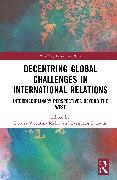Read more
This book examines contemporary global challenges from a decentring perspective, advancing an interdisciplinary conversation. It explains why traditional hegemonic approaches to global challenges are problematic, and conceptualises what a decentring approach to global challenges entails.
List of contents
1. Introduction: Decentring Global Challenges
PART I - WHICH CHALLENGES? A View of Global Challenges from Below 3. Inequitable Global Distribution of COVID-19 Vaccines: A Constructivist Critique 5. Epistemic Violence and International Law: Islamic Thought in the Struggle for Epistemic Equivalency
PART II - WHOSE GLOBALITY? 6. Neither Eurocentrism, Nor East Asian Exceptionalism: An Epistemic Turn on East Asian Ontology 8. Revisiting China-Africa Relations: A Critical Realist Approach to South-South Cooperation 9. Reframing the Global Knowledge Economy: An Afropolitan Approach 10. Questioning International Business and Management Studies: A Decolonial Feminist Critique 11. Conclusion
About the author
Debora Valentina Malito is an Associate Professor of International Relations at Xi'an Jiaotong-Liverpool University (People's Republic of China). Her work combines critical perspectives to the study of global International Relations, conflict and sovereignty. Her current research focuses on global knowledge production, politics of intervention and infrastructures in world ordering.
Evangelos Fanoulis is Lecturer above the Bar in International & Global Politics at the School of Political Science & Sociology, University of Galway (Ireland). His main research interests lie within democracy and populism in Europe, EU foreign policy, and post-structuralist IR theory.

